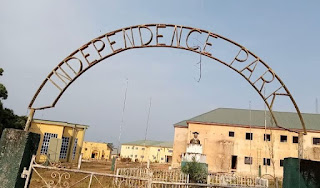The Independence Park in Arochukwu, Abia State, Nigeria, is a significant destination that stands out among the town’s many traveler sights. Unlike the typical entertainment parks, Independence Park holds a special significance and should be a must-visit for tourists.
Located within the surroundings of the Aggrey Memorial Model College, Independence Park was built in remembrance of Mazi Alvan Ikokwu, a notable Nigerian educationist. Born on August 1, 1900, in Amanagwu Arochukwu, present-day Abia State, Alvan Ikokwu’s educational journey began at the Arochukwu Government Primary School from 1911 to 1914. He later attended Hope Waddell College, Calabar, from 1915 to 1920, where he studied under James Emmanuel Aggrey and was classmates with Akanu Ibiam and Eyo Esua. In 1920, he started his teaching career with the Presbyterian Church of Nigeria and Church of Scotland at Itigidi, and two years later, he became a senior tutor at St. Paul’s Teachers’ Training College, Awka, Anambra State. While teaching at Awka, Ikokwu obtained his University of London degree in Philosophy in 1928 through its external program.
In 1932, Ikokwu established the Aggrey Memorial Secondary School in Arochukwu, a co-educational secondary school named after his mentor James E.K. Aggrey, a renowned Ghanaian educationist. His involvement in politics began in 1946, when he was appointed to the Eastern Nigeria House of Assembly and assigned to the Ministry of Education. In 1947, he became part of the Legislative Council in Lagos as one of three representatives of the Eastern Region.
Ikokwu played a significant role in advancing the Nigeria Union of Teachers (NUT), advocating for the Legislative Council’s adoption of 44 NUT recommendations amending various educational statutes. Despite facing resistance in the 1950s, his efforts were eventually vindicated after Nigeria gained independence, as his proposals became the basis for education policy in the new nation.
In 1962, he advocated for an ‘Education Bill of Rights,’ calling for free primary school education for several years nationwide in Nigeria. This proposal was later accepted by the Federal Military Government starting from 1976, leading to the provision of free education for all primary school students. Dr. Ikoku remains a prominent figure in Nigerian intellectual and educational development, recognized as one of the most outstanding educationists in Nigeria’s history.
Following his retirement from government politics, Ikoku continued to serve on various educational bodies in the country. He was a member of the West African Educational Council (WAEC) and the Council of the University of Ibadan, as well as the Chairman of the Board of Governors of the Aviation Training Center.

